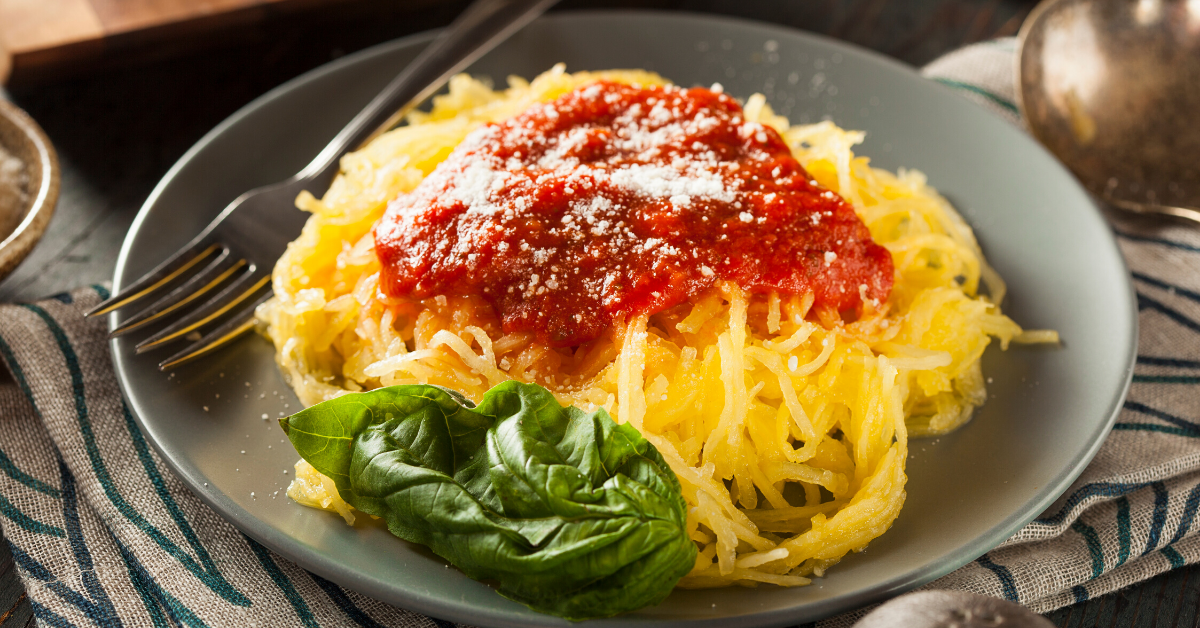
Spaghetti noodles are a high-carb meal no matter what you put on top. Here's an easy replacement to increase nutrition and lower carbohydrates!
Spaghetti squash is a fairly common way to replace carb-heavy spaghetti pasta. When cooked, the inner flesh of spaghetti squash comes out in long, thin strands resembling spaghetti noodles. the flavor is fairly mild, making it easy to add any sauce you want, opening up your possibilities to everything from spaghetti sauce to alfredo, to a simple butter and salt.
The best part is how nutrient-dense this winter squash is! 1 serving of spaghetti squash (1 cup) contains calcium, potassium, vitamin A, vitamin C, manganese, pyridoxine, pantothenic acid, niacin, carotenoids, thiamine, magnesium and folate. It also has a decent amount of fiber, which lowers its total 10g carbohydrates per serving to 8g net carbohydrates.
Here's how to prepare this versatile squash for a perfect alternative to pasta.
Ingredients
- 1 spaghetti squash (roughly 4 lbs)
- Olive oil
- Salt and pepper to taste
Directions
- Preheat your oven to 400°F.
- Prepare the squash: remove the stem from the squash and slice the squash in half length-wise. Dispose of seeds and stringy flesh, down to just the solid flesh.
- Drizzle the flesh (inside) of both halves with the olive oil. Use a basting brush to spread around evenly across the whole squash.
- Shake the desired amount of salt and pepper over the squash.
- Place the squash flesh-side down on a baking pan lined with parchment paper. Poke a few holes in the outside of the squash. This will help the flesh cook through better.
- Bake for up to 40 minutes. Watch for light browning on the outside.
- Remove from the oven and flip the squash halve over. Allow cooling until the squash is no longer hot to the touch, but not cold.
- Using a fork, begin scraping through the flesh along the hollow center to separate strands. Once everything is loose, it is ready to serve.
Top with your sauce of choice!
Nutritional information:
One 4 lb. spaghetti squash will give you about 5 cups. Consider 1 cup as a serving.
- Calories: 66
- Total Fat: 3.2g
- Cholesterol: 0mg
- Sodium: 859mg
- Total Carbohydrates: 10.2g
- Fiber: 2.2g
- Sugars: 3.9g
- Protein: 1g
- Calcium: 34mg
- Iron: 1g
- Potassium: 184mg
Remember to count carbohydrates for whatever sauce you use with your spaghetti squash. This recipe only accounts for the squash.
What makes the nutrients in spaghetti squash healthy?
- Calcium - Almost everyone knows that calcium is essential for bone development and bone health, but it also is important in blood clotting, muscle contraction, and maintenance of a regular heartbeat.
- Potassium – Potassium is important for nerve and muscle health and helps balance sodium levels in your body.
- Vitamin A – Vitamin A helps organs like the heart, lungs, and kidneys work properly; and plays an important role in maintaining the body’s immune system.
- Vitamin C – Vitamin C is necessary for the growth, repair, and development of your body’s tissues.
- Manganese – Manganese is a trace mineral meaning there are tiny amounts of this mineral in your body. Manganese helps the body form connective tissue and bones and helps in blood clotting.
- Pyridoxine – Pyridoxine is also known as Vitamin B6 and is important in keeping your nervous and immune systems healthy.
- Pantothenic Acid – Pantothenic acid is also known as Vitamin B5. The main function of pantothenic acid is in the creation of coenzyme A (CoA) and acyl carrier protein. These substances are important in anabolic (formation of large complex molecules in your body) and catabolic (breaking down on complex molecules to release energy) processes.
- Niacin – Niacin helps your body turn food into energy, keeps your nervous and digestive systems healthy, and keeps your skin healthy.
- Carotenoids – The function of carotenoids is not well known but they are thought to decrease the risk of certain diseases including cancer.
- Thiamine – Thiamine is another of the B vitamins also known as Vitamin B1. Thiamine is important for the growth and function of the body’s cells. It also helps the body generate energy from the food you eat.
- Magnesium – Magnesium helps muscle and nerve function, regulation of blood pressure, and also supports immune health.
- Folate – Folate is important in the formation of red blood cells and for healthy cell growth.
With all the important nutrients in spaghetti squash, it is a superfood that is also tasty. It is also a very versatile food that can be paired with almost any sauce.
